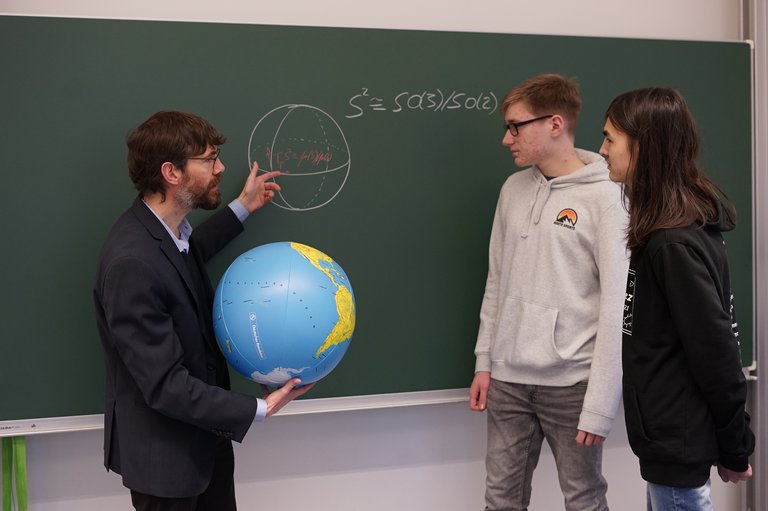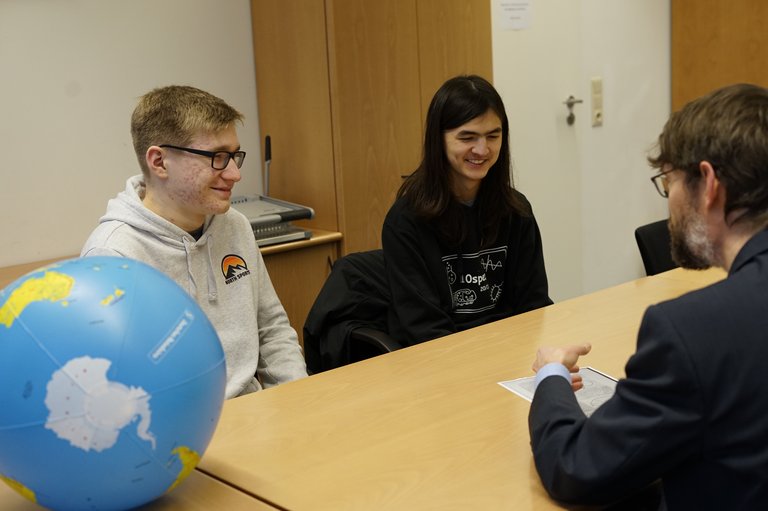While their classmates are chilling after class or pursuing their hobbies, Paul and Luke head for the lecture hall every Monday to take part in the early study program at TU Ilmenau. As 11th and 12th grade students at Goetheschue Ilmenau, the two 17-year-olds have been attending a lecture and exercise in mathematics every week since the start of the 2022/23 winter semester. But that's not all: Like other students, they are also allowed also attend all other events at the university, eat in the cafeteria with their student ID, take exams and have them recognized for later regular studies. They are supervised by mathematics professor Thomas Hotz.

It doesn't happen every day at the TU Ilmenau that high school students study at the university parallel to their classes. "When we received the request from Paul and Luke to participate in the early study program, we were very pleased about it and first of all met and considered together which lectures would be suitable," Prof. Thomas Hotz, head of Probability Theory and Mathematical Statistics: "It was clear: the Abitur must have priority over everything else, and no school lessons must be cancelled in favor of the early studies." The two extensive lectures with which the mathematics program normally starts in the first semester were therefore out of the question for the two.
Instead, Paul and Luke currently attend a lecture on differential geometry from the 5th semester: "This is more or less an advanced way of doing geometry using methods from calculus, which is needed for all theoretical physics, for example for cosmology - a very demanding lecture," Prof. Hotz explains. Early study of mathematics, he says, is therefore only suitable for particularly high-achieving students: "It's not just about the pure content, but also about making someone a mathematician, that is, enabling him or her to write things down and grasp them precisely, in other words, to think like a mathematician."
Paul and Luke are well on their way to achieving this, Prof. Hotz is convinced. But above all, the whole experience should be fun and whet their appetite for more, and the exercise following the lecture should give them the opportunity to ask questions. If there is still a problem, the instructor and the professor are also available to answer questions during their office hours. But for the two of them applies what is true for all students, "We can support them, but above all their independence is required."
UNIonline spoke with Paul and Luke about their experiences as early students at TU Ilmenau.
How did you find out about the early study program?
Paul: At the time, I asked the university myself whether there was something like this at the TU Ilmenau, because Mr. Moldenhauer, a mathematics student at the TU Ilmenau, was in charge of a performance center at our school and supervised me in my special subject thesis, and I knew from a participant in an Olympiad that there was something like this at other universities.
Luke: After Paul initiated that, I was approached by our special class leader about whether that would be interesting for me as well.
What exactly made you decide to start early studies while you were still in school?
Luke: For me, it was simply seeing the personal interest in it: What is it like to study like this, and what knowledge is there that I don't already know? So it was mainly about mainly broadening my horizon. And, surprisingly, I still have a lot of free time besides school.
Paul: I was mainly interested in the subject area and I think it's good to get a bit of an insight into how lectures and exercises work at university, and if necessary even to take certain exams in advance.
What exactly fascinates you about mathematics?
Luke: I would most likely describe it as the naive attempt to want to understand basic things. And if I understand mathematics, then physics also becomes easier, because one is based on the other and a whole lot of things are based on mathematics. So to put it very simply: It's about the desire to understand the world.
Paul: I would add that it is quite fascinating when you can deduce so many properties and gain new insights from a few basics and little structure.
You are currently attending a lecture on differential geometry. What are you dealing with here?
Paul: Differential geometry deals with objects such as curves and surfaces and their properties in higher-dimensional spaces.
Does that have anything to do with this globe you brought with you, Prof. Hotz?
Prof. Hotz: Yes, we used it to illustrate that the sphere is diffeomorphic to SO(3) / SO(2): if you take this globe, then this sphere is perfectly symmetric under rotations in all possible directions. Differential geometry is about describing more generally the phenomena that occur in this process, that is, understanding what makes certain multidimensional spaces symmetric and what, in turn, are the implications of that for physics, for example, for the conservation of energy.
Can you both keep up with this material and can you also tie in with school material?
Luke: Studying at university is very different from school, and I personally sometimes lose the thread. But I think I understand the basic concepts well enough to then do further research on my own.
Paul: It does require some personal reworking. I often do that on the weekend. In school, something is usually introduced, then you do small examples and an exercise on it, which is helpful for understanding. There are no exercises like that in the lecture; you have to do it on your own at home.
Would you still choose early study again?
Luke: I would do the early study again, even if it is only one more year until I study properly anyway.
Paul: I like early study so much because I'm already familiar with the material in many subjects at school and the lessons often don't add much value for me, especially since I already know roughly what direction I want to go in.
What exactly are your plans for after school?
Luke: For me, the plan looks pretty simple: I pretty much want to study math, unless I almost get struck by lightning and that suddenly convinces me to study computer science. I also want to study specifically here at the TU Ilmenau. My parents also studied here. Therefore, I know that the university is very good when it comes to mathematics, computer science and technology.
Paul: I would like to continue the early studies in the 12th grade and then also study at the TU Ilmenau after school. Because the lectures here are not so huge, you can also just ask if you haven't quite understood something. Individual contact with the lecturers is also possible here. I already know large parts of the student body because I did a two-week internship with Prof. Worthmann before I started my studies and was even invited to go on a retreat in Siegmundsburg with the research groups of Prof. Worthmann and Prof. Hotz after the end of the lecture period. I also enjoyed the lectures there very much, and I kept up surprisingly well.
Do you already have a specific career in mind when you choose your course of study?
Luke: That's the question, of course: What do you do with it? I can most likely imagine staying in "pure" mathematics, i.e. becoming a professor. That's a long way off, but at the moment I don't have enough imagination to think of other professions.
Paul: I'm still a little unsure about that. In any case, I would like to go into research. I would rather consider an academic career and hope to get a professorship as early as possible, if possible. However, I am very interested in both mathematics and theoretical physics, which is why I have not yet made a final decision on which field I will eventually go into. Mathematics is my favorite at the moment, though.
Thank you very much for the interview!
About the Early Study Program
TU Ilmenau enables high school students and participants of the Voluntary Ecological Year (FÖJ), the Voluntary Social Year (FSJ) or the Voluntary Scientific Year/Voluntary Year in Science, Technology and Sustainability (FJW/FJN) to study early at the university. This entitles them to participate in selected modules in non-admission-restricted degree programs, to take study and examination credits, and to acquire corresponding credit points. The successfully completed study and examination achievements will be recognized in a later study program at the TU Ilmenau. More details on this and on the admission requirements are regulated in the Regulations for the Implementation of Early Studies at the TU Ilmenau.
Contact
Prof. Thomas Hotz
Head of Probability Theory and Mathematical Statistics


